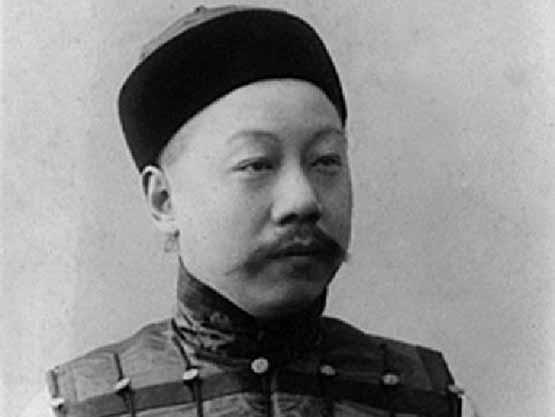During the Republic of China period, Gu Weijun was the number one diplomat and experienced many major events in his life that were enough to enter the annals of history.
However, in Gu Weijun's heart, he also had an old predecessor he greatly admired, that is, Hu Weide, who had served as foreign minister of the Qing Dynasty, the chief foreign minister of the Republic of China, and also acted as the prime minister of the Republic of China.

Hu Weide was not only a master of diplomacy, but also the first witness to Empress Longyu's announcement of the abdication of the Qing Emperor.
At that time, the north and south negotiated peace and discussed the preferential treatment given to the Qing dynasty, and Empress Longyu saw that the preferential conditions were very generous, which was already the best result, so she accepted it.
On February 12, 1912, the Qing court organized the last pilgrimage ceremony, Yuan Shikai, since he was stabbed, he no longer went to the court, entrusted the minister of foreign affairs Hu Weide to ask Empress Longyu and Emperor Xuantong for the last time.
After Empress Longyu ascended to the throne, she read the abdication edict again, thinking that the Qing Dynasty's 200-year-old Jiangshan would be destroyed in her hands, the more she thought about it, the more sad she became, and when she looked at it, she cried loudly and tightly held the abdication edict in her hand, and the tears were about to wet the abdication edict.
This can frighten a bunch of ministers, but it can't affect the peace between the north and the south, if Empress Longyu is angry and tears this thing up, then the trouble will be big!
Just at this moment, Hu Weide suddenly remembered a telegram from the Revolutionary Party that he had just received yesterday, immediately took it out, and said loudly: "Don't cry first, there is another telegram here, and the most important thing is to keep the preferential treatment of the clean-up room!" ”
Long Yu immediately stopped crying and asked Hu Weide, "What's wrong?" Is it remorseful and not preferential treatment? Bring it on. ”
Hu Weide hurriedly presented the telegram, and Longyu looked at the telegram, which read: "Ten thousand urgent." Today, with the consent of the Senate, if the Qing Emperor does not abdicate before 12:00 p.m. on the 15th, the preferential conditions will be withdrawn. This cloth, that is, to Beijing. ”
After Empress Longyu read it, she quickly handed over the edict and asked Xu Shichang to stamp it, fearing that the revolutionaries would regret it later. In this way, the Great Qing Dynasty completely went to the grave of history on this day.
At this important historical moment, Hu Weide is an important witness and a key figure that should be recorded in China's history.
In April 1926, Feng Yuxiang led troops to expel Duan Qirui, and suddenly, there was no leader in Beijing, and only Hu Weide, the chief of foreign affairs, struggled to support the crisis. On April 20, Duan Qirui, seeing that he was powerless to return to heaven, announced his resignation, appointed Hu Weide as prime minister, and assumed the temporary ruling authority, and Hu Weide also reached the peak of his political career.
However, Hu Weide is very clear that the current situation is simply unable to balance and solve the problem, so he strongly demands that he is older and cannot adapt to such a high-intensity work, and only agrees to act as the prime minister.
In this way, Hu Weide became the acting premier and served for 53 days, until Yan Huiqing formed a cabinet and became the prime minister, Hu Weide resigned his post and went home to live in seclusion.
In 1933, Hu Weide died of illness in Beijing at the age of 70.
Hu Weide successively served as a minister to France, a minister to Spain, a minister to Portugal, and a minister to Japan, and played an important role in important events such as the Paris Peace Conference.
It is also worth mentioning that Hu Weide's son, Hu Shize, was also a famous diplomat and the first Chinese Deputy Secretary-General of the United Nations.
History Inn Author: Desert Sand